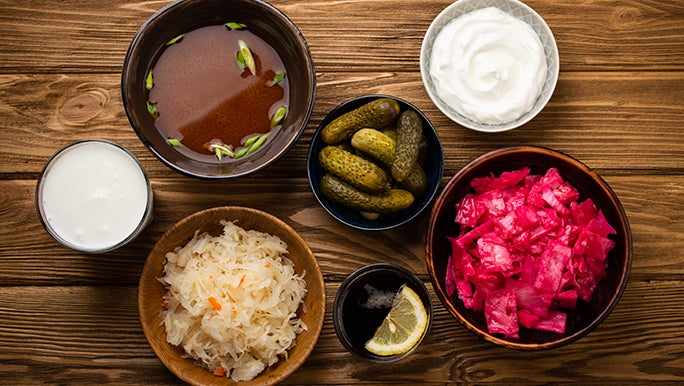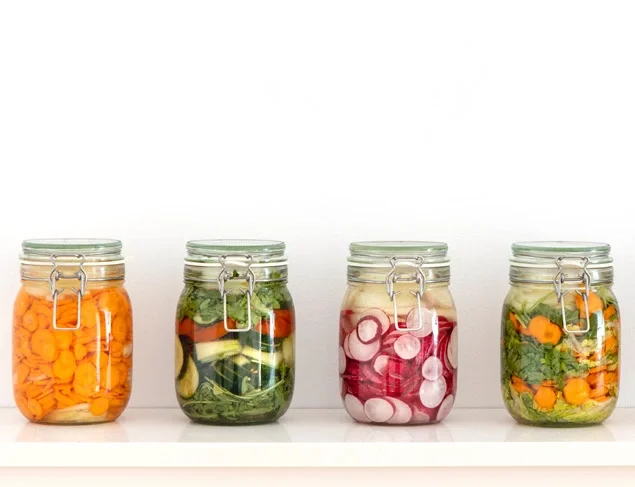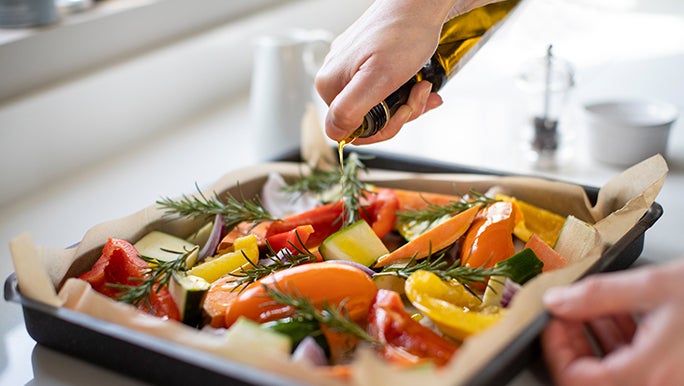How to increase the good bacteria in your gut naturally

Key points about how to increase the good bacteria in your gut
- Gut health depends on the balance of the good and bad bacteria living in it.
- Those bacteria are called gut microbiota and the composition you have is unique to you.
- An imbalance of bacteria, called dysbiosis, could be linked to short and long term health issues.
- Increasing the good bacteria in your gut can help you feel healthier overall.
Increasing the good bacteria in your gut naturally is one of the most important steps you can take to improve your gut health. A lot has been said about the best foods for gut health – the foods that help keep the good bacteria happy inside your insides.
First, let's talk about the microbiome.

Gut health looks different for everyone because everyone’s insides are different.
Gut health vs. gut microbiome – what's the difference?
Registered Nutritionist Sarah Gray explains that the terms ‘gut health’ and ‘gut microbiome’ are linked.
“Gut health generally refers to the health of the gastrointestinal tract. Gut microbiome describes the trillions of microorganisms (mainly bacteria) that live in the gastrointestinal tract,” says Sarah.

Gut health and sleep – what’s the connection?
Could your gut health be affecting your sleep? We take a closer look.
The main role of the gut microbiome – which consists of trillions of microorganisms called microbiota – is to help your body process food that isn't digested in your stomach and absorb nutrients. The microbiota are also known as ‘gut flora’.
Research suggests other important roles that the gut microbiome may play in various areas of our health, such as immune health and mental wellbeing.
So, if you want a healthy gut, one thing to look at is what could be affecting your gut microbiome. And then work out what steps you could take that may help, such as finding out what foods might help increase the good bacteria in your gut, naturally.
“The amazing thing about the gut flora, is that everyone’s microbiome is unique, just like your fingerprint. No two people have the exact same makeup of bacteria in their gut,” says Sarah.

If your gut is telling you something isn't quite right, listen to it and consult a health professional.
Why is my microbiome such a big deal?
If the good and the bad bacteria in your microbiome are balanced, your gut health will be happy. If that balance changes, it's called dysbiosis which may be linked to a range of health issues.

Worried about the health effects of alcohol? You’re not alone
What is the sober curious movement? It’s basically for people who don’t identify as having a drinking problem, but want to examine the effects that alcohol has on their lives. If that sounds like you, here’s what you need to know…
A simple symptom of dysbiosis could be an upset stomach or bowel issues. This may potentially fix itself when whatever has upset your stomach has passed, such as antibiotics, too much alcohol or mild anxiety.
There is also research happening on genetic dysbiosis, which means you could be more vulnerable to certain health conditions within your family.
Keeping the bad bacteria in check and making sure the good bacteria are thriving is one way to try to support your gut health. And in turn, it could possibly help your overall health.
“Gut health may potentially play a role in other things such as whether you’ve got clear skin or acne breakouts,” says Sarah, “Imbalances in the gut aren't just signs of gut issues, it could be bigger than the gut itself.”
Tips to increase the good bacteria in your gut naturally
If you think you might have some gut health issues, there may be things you can do to help restore healthy gut flora or bacteria.
- Eat more veggies – vegetables are useful sources of prebiotics and dietary fibre.

Are fermented foods the key to good gut health?
Fermented foods have been around for ages, but what do they do for gut health? Let’s ask the expert.
- Read about fermented foods for gut health and what probiotics they may contain.
- If you’re on a course of antibiotics, discuss with your pharmacist about taking a course of probiotics. Antibiotics are good for helping with infections, but they don't discriminate between good and bad bacteria so your microbiomes may need some help to regain their strength.
- Consider if there are potential sources of stress in your life that may be interfering with your gut. Something like meditation may be able to help, so check out these basic meditation tips.
- Make sure you stay hydrated. Not only is it good for your skin but it should keep your internals smooth so ‘things’ don’t get stuck on their way out! Think about starting a new habit to consume more H2O.

There may be things you can do to help restore the healthy gut flora or bacteria.
Follow your gut to improved health
Gut health looks different for everyone. When you know what your normal is, observing and understanding your bowel movements may give you an insight into your gut microbiome health.
Consider taking steps to increase your good gut bacteria naturally. If your gut is telling you something isn't quite right, listen to it and consult a health professional.
Related:
- Stress and immune system health
- What you need to know about the effects of exercise on the immune system
Sarah Gray is both a Registered Pharmacist and Registered Nutritionist with a particular interest in health education and helping people to take small steps to big change in their health journey. Sarah is the Head of Health and Nutrition on the healthylife Advisory Board.
Reviewed by the healthylife Advisory Board August 2021.